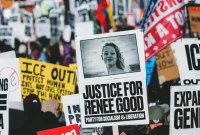Protesters Embrace Digital Tools to Monitor ICE Actions Amid Increased Surveillance
As protests surge across the United States in response to rigorous Immigration and Customs Enforcement (ICE) operations, civilians are leveraging digital tools to monitor ICE arrests and raids in real time. However, newly uncovered government documents have revealed that U.S. intelligence agencies are now considering these grassroots monitoring tools as potential security risks. An investigation by law enforcement is reportedly underway in relation to these digital mapping platforms.
Government Surveillance of Civilian Mapping Initiatives
Recent internal communications acquired by the nonprofit watchdog Property of the People indicate that domestic intelligence centers are closely observing details related to the "No Kings" protest, particularly those taking place in California. These centers disseminate speculative threat assessments among federal, state, and local agencies, revealing heightened scrutiny of peaceful demonstrations.
In a late-February bulletin distributed by a regional fusion center in Vermont, several interactive mapping websites were identified. These platforms allow users to place "pins" to indicate ICE encounters, emphasizing a widespread civic engagement aimed at avoiding interaction with federal agents. While the bulletin acknowledges that most users are civilians, it also raises concerns about "malicious actors" potentially misusing these tools to target law enforcement.
The bulletin, based on intelligence from the Army’s threat monitoring center, the Army Threat Integration Center (ARTIC), notes that information pertaining to these mapping tools may be linked to ongoing law enforcement investigations.
Community Response and Transparency Concerns
Property of the People sought further details about the mapping tools and was informed by the Northern California Regional Intelligence Center (NCRIC) that all related information is connected to active investigations. This response has not been followed up with comments from the NCRIC.
Ryan Shapiro, executive director of Property of the People, criticized the law enforcement community’s concerns, stating, "Law enforcement is sounding the alarm over implausible, hypothetical risks allegedly posed by these ICE raid tracking platforms. But transparency is not terrorism; the real security threat is militarized secret police invading our communities and abducting our neighbors."
Documents examined indicate that mapping tools being shared across platforms like Reddit and Padlet are seen as strategic threats. A February report from the Wisconsin Statewide Intelligence Center (WSIC) similarly flagged these sites for monitoring, expressing concerns about explicit posts aimed at ICE officers.
Increased Monitoring of Planned Demonstrations
A mid-May report from the Central California Intelligence Center (CCIC) highlights the agency’s tracking of upcoming protests, specifically the "No Kings" events planned in cities such as Sacramento, Fresno, and Stockton. While the gatherings are characterized as nonviolent, the CCIC plans to issue further intelligence for "threat liaison officers."
This report acknowledges the right of citizens to assemble and petition the government but frames the intelligence-gathering activities as essential for ensuring public safety.
Nationwide, approximately 2,000 protests are scheduled alongside a military parade in Washington, D.C., featuring thousands of U.S. Army personnel and military equipment. The protests arise in reaction to a Trump-ordered immigration crackdown and the deployment of federal troops—including Marines and National Guard units—to assist local law enforcement.
Growing Tensions Over Military Presence
Demonstrators across Los Angeles and other U.S. cities condemn what they perceive as an authoritarian display of force, compounded by the use of surveillance drones and armored vehicles in immigrant communities. This has raised alarm over civil liberties and the legality of deploying military resources for the suppression of civil unrest.
As debates intensify over the employment of military-grade equipment and the limitations on troop authority, the organizers of the No Kings movement have framed their protests as a nationwide assertion of defiance. They state, "From city blocks to small towns, from courthouse steps to community parks, we’re taking action to reject authoritarianism—and show the world what democracy really looks like."
In summary, the intersection of grassroots efforts to monitor ICE activities and the institutional surveillance of these efforts highlights the complexities of civil liberties in the current socio-political climate.



